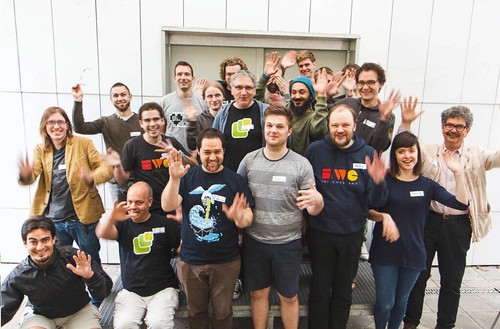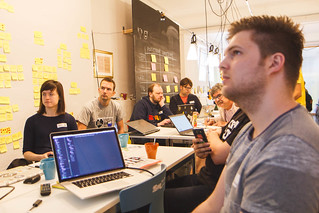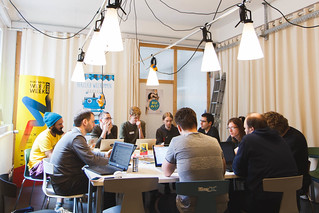There’s nothing the Conservative Party seems to enjoy more than a midcampaign wobble. It usually lasts a couple of days before things get back on an even keel. This one has lasted more than ten days. Election campaign wobbles often happen when the chain of command isn’t clear – when no one knows who is actually in charge. Think back to 1987 when no one in CCHQ was clear whether Lord Young (put in CCO by a prime minister who had doubts about her party chairman) or Norman Tebbit (who had lost Mrs T’s confidence). Think back to 2010 when no one really knew whether it was Lynton Crosby, George Osborne or party chairman Eric Pickles.
So how do the Tories get their campaign back on track? When Sir Lynton Crosby was hired to run this election campaign he will have known that his chief interlocutors would be Fiona Hill and Nick Timothy, the Prime Ministers two most trusted lieutenants. Neither of them suffer fools gladly and they expect to get their own way. They are conviction people. They lack self doubt. And they expect their will to be done and Number Ten is run in their image. Number Ten may not be as happy and chilled out as under David Cameron but their iron rule has made it a much more effective operation, even if the written and broadcast media have found the place far more difficult to deal with.
Neither Hill, nor Timothy has been involved in running a general election campaign before. In itself that shouldn’t necessarily be a problem, but when an election is called so unexpectedly it is not surprising that things have been more difficult than they otherwise might have been. Take the manifesto, for example. It is widely reported that the manifesto was almost exclusively written by Nick Timothy. It is said that Health Secretary Jeremy Hunt wasn’t even consulted about the Social Care policy and was told about it – yes, told – only hours before the media. It was the same for Damian Green. I have no idea what either of those gentlemen thought about the policy. I haven’t asked them. We know, or we think we know, that John Godfrey, the Number Ten Head of Policy and Fiona Hill were both against it, and Theresa May made the final decision to overrule them and include it in the manifesto. As I said on Newsnight on Friday night, ultimately the buck stops with her. Advisers advise, ministers decide.
I have no idea whether Lynton Crosby had any right of veto over any part of the manifesto. He certainly would have had in 2015. I doubt whether he did this time. If he didn’t, he should have.
On Tuesday morning all the leading lights of the campaign will be meeting in London to decide the strategy for the final eight days of the campaign. Leaving aside the fact that this meeting should have been taking place today, there are a number of decisions that meeting should make.
The first is that Lynton Crosby must be given full and absolute control of the campaign. He knows what he is doing. He’s run enough campaigns for everyone to have complete and total trust in him. I know from my own experience back in 2005, he is a leader of men and women and is the sort of person people die in a ditch for. No one should second guess him. He must lay out the strategy and have the power to implement it. He must define the messaging for the next nine days and ensure that everyone sticks to it.
The Conservatives’ media strategy has so far been based around a very select view of politicians who are allowed on TV and radio. This group needs to be expanded. The “When in doubt send for DD, Fallon or Gauke” strategy is OK as far as it goes, but in the current media age they can’t do it all. There are too many outlets to satisfy. Interestingly IDS and Michael Gove are being used, but that very fact has severely hacked off other perfectly competent media performers who happen to be senior ministers. Where on earth is Liam Fox? Greg Clark? Patrick McLoughlin? In any normal campaign the Conservative party chairman would effectively be ‘Minister for the Today Programme’. I may be wrong, but I can’t recall hearing Patrick McLoughlin, one of the Cabinet’s most reassuring voices, give a single broadcast interview since the election was called.
In addition, the women’s vote is haemorraghing to Labour. The lead is down to one point. There are lots of capable Tory women who should be used on the media far more than they have been so far. Justine Greening, Margot James, Andrea Leadsom and many more need to become a much more integral part of the campaign.
Boris Johnson has been allowed out occasionally, but we’ve only seen the Chancellor once. In a war, you deploy your strongest weapons, even if occasionally they might end up aiming in the wrong direction. Just as I am suggesting that the Tories should let Lynton be Lynton, they should also let Boris be Boris. Philip Hammond is also an underrated media performer. Given what I am about to write, he needs to now be front and centre of the campaign.
If we look back to 18 April, the day the PM called the election, we ought to remind ourselves of the reason this election was called. Remember these words from the Prime Minister?
“At this moment of enormous national significance there should be unity here in Westminster, but instead there is division. The country is coming together, but Westminster is not. In recent weeks Labour has threatened to vote against the deal we reach with the European Union. "The Liberal Democrats have said they want to grind the business of government to a standsill. The Scottish National Party say they will vote against the legislation that formally repeals Britain’s membership of the European Union. And unelected members of the House of Lords have vowed to fight us every step of the way. Our opponents believe that because the Government’s majority is so small, our resolve will weaken and that they can force us to change course. They are wrong. They under-estimate our determination to get the job done and I am not prepared to let them endanger the security of millions of working people across the country. "Because what they are doing jeopardises the work we must do to prepare for Brexit at home and it weakens the Government’s negotiating position in Europe. If we do not hold a general election now their political game-playing will continue, and the negotiations with the European Union will reach their most difficult stage in the run-up to the next scheduled election. Division in Westminster will risk our ability to make a success of Brexit and it will cause damaging uncertainty and instability to the country. So we need a general election and we need one now, because we have at this moment a one-off chance to get this done while the European Union agrees its negotiating position and before the detailed talks begin. I have only recently and reluctantly come to this conclusion. “Since I became Prime Minister I have said that there should be no election until 2020, but now I have concluded that the only way to guarantee certainty and stability for the years ahead is to hold this election and seek your support for the decisions I must take. Every vote for the Conservatives will make it harder for opposition politicians who want to stop me from getting the job done. Every vote for the Conservatives will make me stronger when I negotiate for Britain with the prime ministers, presidents and chancellors of the European Union. Every vote for the Conservatives means we can stick to our plan for a stronger Britain and take the right long-term decisions for a more secure future. It was with reluctance that I decided the country needs this election, but it is with strong conviction that I say it is necessary to secure the strong and stable leadership the country needs to see us through Brexit and beyond.”
This was supposed to be a single issue election. It has become anything but. The Manchester terror attack has reenforced that fact. Even before the bombing Labour had managed to seize the initiative. Deliberately leaking their manifesto gave them five days of dominating the news. The Conservatives assumed the electorate would laugh at the manifesto. The electorate did the opposite, finding it eyecatching, radical and bold. By contrast the Tory offering six days later was seen as boring, stale and didn’t have a single eyecatching initiative for Tory canvassers and candidates to go out and sell on the doorstep. And the single policy which did stand out, turned out to be a stinker.
The rest of this election campaign needs to be fought on Tory territory, not Labour’s. There should be four strands to the remainder of the campaign and it’s Lynton Crosby’s task to make sure they become the narrative of the next nine days…
- Get Brexit back on the agenda
- Security for all
- A strong economy
- Leadership
Getting Brexit back on the agenda won’t be a simple task. Only two pages out of 84 in the manifesto were Brexit. Why? Because there wasn’t anything new to say. There still isn’t. There is no prospect of giving any more details of the government’s negotiating strategy. If Juncker or Tusk say anything stupid over the next few days, it’s job done, but even they aren’t that stupid. What the PM and David Davis must do is look forward to the negotiations starting only eleven days after the election, and contrast their approach to the task in hand with that of the Labour Party.
There is little doubt that a national crisis like the one over the last week plays into the hands of the incumbent prime minister. By definition, it is the PM who is making the decisions and reacting to events. The Leader of the Opposition can do little but to support the actions of the PM. The PM is able to show leadership, something the Leader of the Opposition can’t really do. That’s why it was important for Jeremy Corbyn to make that speech on Friday morning – to hit the ground running and seize back the agenda. Well he did that, but couldn’t resist the self indulgence of talking about issues which he must have known would be a gift to the Tories.
However, there are risks here too for the Tories. They’ve launched an all out initiative to paint Corbyn as a terrorist sympathiser, but in doing so risk going over the top. They certainly have raw material to attack Corbyn in that manner, but sometimes it’s best to be quite subtle about these things rather than completely in voters’ faces. Sometimes you have to trust the people to work it out for themselves, albeit with a little help. Instead of a constant attack on Corbyn I suspect it would be better to concentrate the fire on the prospect of Diane Abbott (sans Afro) becoming Home Secretary. She is both viewed as an extreme left winger and hopelessly incompetent. Her interviews with Nick Ferrari, me on Friday and Andrew Marr today have done nothing to alter that view. The Tories should exploit it.
Most election revolves around whether people think they will be better off or not over the ensuing five years if they vote for one party rather than another. Although this election is somewhat different, there is still time for it to be framed around the concept of ‘stick to nurse for fear of something worse’. Economic competence v Labour’s magic money tree. The trouble is, the media has framed it as ‘More austerity and an uncosted manifesto v Labour’s eyecatching economic proposals’. So far, much of the electorate has bought into that and decided that some tax rises for the rich and penalising big multinational corporations by dramatically increasing business taxes will indeed lead to “our NHS” getting all the extra funding it needs. It’s been a major failure of the campaign so far not to have combatted this narrative. I have no idea why Philip Hammond has barely appeared in this campaign so far, but that needs to change, and change now.
The leadership issue is clearly the easiest and it has already been a running theme, but this needs to be hammered home in all sorts of ways in the runup to June 8th. But when I say ‘hammered home’ there needs to be a subtlety about it. Jeremy Corbyn has a certain zen calmness about him and even under huge pressure he usually manages to suppress his annoyance and anger at the way he’s being questioned. We saw that on Friday in his interview with Andrew Neil. In many ways it ought to have been seen as a car crash for him – and if you’re a Tory watching it, you’ll think it was, but Andrew Neil didn’t really rattle him once despite a very hostile line of questioning. Although his answers were often all over the place, Corbyn just remained in a zen like state. Many elements of the electorate quite like that and they don’t seem him as the ‘pseudo commie terrorist sympathiser’ the Conservatives are portraying him as. The messaging on this has to be very careful. In any normal election May v Corbyn as a leadership contest ought to be a one horse race. The Tories now need to make it one.
A 15-20 point Tory lead has evolved into a 7-14 point lead. The best poll for Labour was a Yougov poll which showed a 5 point lead on Friday. That had increased to 7 points in today’s YouGov poll. I’ve always thought of YouGov and ICM polls to be the most reliable, but the latest ICM poll shows a 14 point lead. They can’t both be right. In some ways a lower poll lead is a good thing for the Tories. I know that sounds odd, but there’s certainly no talk of complacency any longer, and a smaller poll lead will help persuade Tory voters to actually go out and vote. However, a narrative is developing that any majority which isn’t three figures will be seen as a defeat for Theresa May. It’s quite ridiculous, of course, because any majority in excess of 50 would surely justify the Prime Minister’s decision to call the election in the first place. Was Margaret Thatcher’s 44 seat majority in 1979 seen as a defeat for her? Of course it wasn’t.
Earlier in the campaign I predicted that the Conservatives would get around 390 seats and Labour around 165, with the LibDems on 16 and the SNP on 53. I might revisit that in the final week, but I’m not sure I see any real grounds to change it at the moment. Perhaps the LibDems are a little high, given that their campaign hasn’t taken off at all.
So, to sum up, here’s what should happen to the Tory campaign…
1. Let Lynton be Lynton and give him total control
2. Brexit means Brexit, and it needs to be a dominant issue in the last 9 days
3. Widen the circle of ministers appearing on the media
4. Deploy Boris
5. Deploy Philip Hammond and take the fight to Labour on the economy
6. Leadership, leadership, leadership – make the contrast at every available opportunity
7. Constantly raise the prospect of Diane Abbott as Home Secretary
8. Ensure the country sees the Conservatives as the party of security and defence
9. Underplay the poll lead so as not to risk a low turnout
10. Address the issue of the women’s vote disappearing to Labour
And finally [brace yourselves], the most radical shift of all… If the Tory lead was to continue to fall I’d suggest that serious consideration is given to ditching the social care pledge altogether. It would be a complete humiliation but I’m not sure that the party leadership understands what a disaster it has been on the doorstep and on the radio phone-ins. The partial U-turn on Monday meant that the hole digging had been put on hold. But perhaps it may be time to fill the trench back in. A strong and stable Prime Minister might find it a difficult one to sell, but admitting you’re wrong can sometimes be a refreshing lance of the boil. Tony Blair was usually at his most popular when he admitted he’d cocked up. Cameron the same. But if it’s to be done, it needs to be done in the next 48 hours. Better brains than mine need to be thinking about the pros and cons of doing this, and I’m assuming they may have done so already. At least I’m hoping they have…






 News reports have been covering a fascinating
News reports have been covering a fascinating